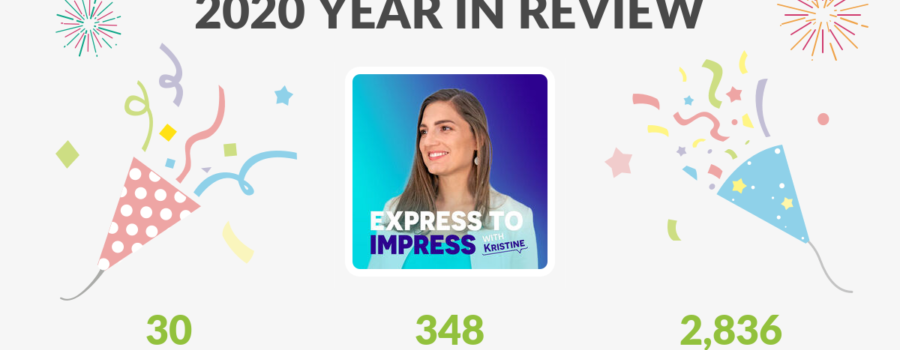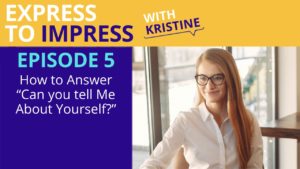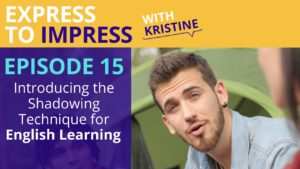Introduction
Hello! It’s Kristine here with the Express to Impress podcast. It’s hard to believe that the podcast has been around for a whole year! Woo hoo!
I recently listened to a Best of 2020 episode on the podcast Armchair Expert with Dax Shepard and loved the concept. So, in this episode, we’ll dive into the Best of 2020 for Express to Impress. Moreover, you’ll hear about the impact of Express to Impress in 2020 and listen to clips from the most popular episodes. Stick around–it’s gonna be a lot of fun!
Don’t forget to subscribe to receive notifications whenever I release a new episode. For example, you can subscribe on Apple or my website at express-to-impress.com.
Now, let’s begin!
Express to Impress Podcast 2020 Year In Review
Let’s take a moment to review what happened with the Express to Impress Podcast in 2020. It was my first year podcasting, and it took until April to really get the hang of it. The podcast covers Interviewing, Learning English, Job Search Communication Skills, and Business English Communication. Listeners were most interested in episodes about learning English and interviews.
So let’s see which episode of the Express to Impress Podcast was the most popular. Drum roll please….It was How to Answer “Can you Tell Me About Yourself?”, published May 4th and downloaded 210 times.
Next, let’s look at our most popular city. The Express to Impress Podcast was downloaded 104 times from…Taipei, Taiwan!
Okay, so how many episodes were there? There were 30 episodes totaling about 6 hours of content.
Finally, let’s see where the podcast was downloaded worldwide. In 2020, 38% of listeners were in North America, 33% were in Asia, 17% were in Europe, 6% were in South America, 2% were in Africa, and 2% were in Oceana.
Thank you for tuning in to the podcast in 2020! With your help spreading the word about the podcast, I know it will grow in 2021. I can’t wait!
Can’t read it now? Pin it for later!
Express to Impress 2020 Year In Review
Now, I’d like to share about the impact Express to Impress made in 2020.
- Over 300 of my clients were hired! That’s right! I worked with many people one-on-one, and others received job offers after completing one of my online courses.
- Over 20 of the international doctors I worked with in 2019 were accepted to US Medical Residency or Fellowship Programs in 2020!
- More than 50 professionals worldwide received presentation skills training. I delivered presentation training workshops and critiqued employee presentations weekly for a corporate client.
- Four courses for job seekers were released. I released my premium 5-hour online course How to Land Your Next Job and the shorter, laser-focused courses How to Succeed in a Job Interview, How to Write a Standout Resume, and How to Create a LinkedIn Profile That Gets You Job Offers.
Thank you for telling your friends and family about the services and products I provide. I can’t wait to meet new people looking to advance their careers in 2021 and create new content that helps people achieve their goals!
Best of 2020 Express to Impress Podcast
Now let’s listen to clips from the most popular episodes in 2020!
How to Answer “Can You Tell Me About Yourself?”
From episode five, How to Answer “Can You Tell Me About Yourself?”
Today, I’ll be talking about how to answer the most common interview question, “Can you tell me about yourself?”
What Makes a Successful Interview?
To answer this question well (and any other question for that matter!) it’s important to keep the goals of your interview in mind. To get a job offer, you need to accomplish three goals.
- First, you need to communicate the value you offer. What do you bring to the table that other candidates don’t? What makes you capable of performing the job? What can you do for the company to make things better? The content of your answers, combined with your poise, delivery style, and communication skills, inform the interviewer of the value you offer.
- Second, you have to make the interviewer believe that you are a good fit. Your interviewer has to believe you would fit well into the culture and that you share the company’s values.
- Third, your interviewer has to like you. Your interviewer has to feel good around you. They have to feel so comfortable around you that they would be able to see your face nearly every day! They have to believe that they would get along with you, enjoy your company, and be productive alongside you.
Story
This next client was interviewing for her first job to be a Certified Registered Nurse Anesthetist. She wanted to convince the interviewer of her passion for client care and show her intellectual drive. Other goals were to show her motivation and readiness for working as a CRNA.
First of all, thank you for inviting me to the interview. I am very excited to have an opportunity to introduce myself. I graduated with a nursing degree from the University of Missouri Magna Cum Laude. Then, I worked as an ICU nurse in a transplant hospital for three and a half years. I also worked as a nurse at a burn ICU at a level one trauma military hospital. I’m attracted to critical care because it challenges me intellectually, and I like helping people in crisis. Apart from my regular ICU duties, I have participated in a research study to find ways to reduce the 30-day readmission of post-liver transplants.
After a year of being a nurse, I became interested in pursuing a career as a CRNA. I love that CRNAs can administer anesthesia and are able to manage patient care independently and respond to difficult situations. Additionally, one of my goals is to volunteer, and I like how CRNAs are highly needed professionals nationally and internationally and can help people in need.
So, I began looking for a school known for its academic and clinical programs and settled on Georgetown University’s nurse anesthesia program. I got accepted, and the program confirmed that anesthesia is the specialty for me. I recently graduated and just passed the National Certification Examination for Nurse Anesthetists. Now, I’m here today, interviewing for my first job as a CRNA! I believe the ICU unit of your hospital would be the perfect place for me to serve patients. You have a strong reputation for providing exceptional patient care, which is something I care deeply about.
Introducing the Shadowing Technique for English Learning
From episode fifteen, Introducing the Shadowing Technique for English Learning.
What is the Shadowing Technique?
Professor Alexander Arguelles developed the Shadowing Technique to improve one’s speaking skills in another language. Shadowing involves repeating someone’s speech immediately after they say it. It’s like you’re following them as your shadow follows you. The beauty of this technique is that anyone can do it alone. Since most people learning a second language don’t have the opportunity to speak with native speakers often, speaking it on your own is the next best thing.
It’s such a fantastic technique because it allows you to speak English exactly as a native speaker. Bam! Just like that, you are communicating with perfect English grammar! And you feel what it’s like to move your voice up and down like a native speaker. You get to feel what it’s like to pronounce vowels and consonants in new ways. You get to feel what it’s like to make your voice louder and to drag-out sounds. You get to pause sometimes. When we read or speak in another language, these are really hard things to do on our own.
My Experience Using the Shadowing Technique
Now, I’ll tell you about my experience using the shadowing technique. I love podcasts, so I usually use the shadowing technique while listening to Spanish or Portuguese podcasts with a female speaker whose voice I like. I always slow down the speed to a reasonable pace for me, like 85%. First, I listen to the audio for the joy of it and to learn something new. Then, I listen to it again and use the shadowing technique. Right after the podcast host starts talking, I start repeating her. Honestly, I feel rushed and must focus intently because the host talks so quickly. Even at 85%, the host speaks faster than I do naturally in Spanish or Portuguese.
I must try to change my voice to sound like the native speaker. I have to pronounce words differently than I typically do. I must say some words very quickly and link them with others. In some cases, I say a word I know in a new way, with the stress in a new place. I’ll discover I’ve been saying a word wrong. I also use vocabulary that I don’t usually use, even though I may understand it when I hear it. And I say things in new, more natural ways for native ears. It never fails –I always discover errors I’ve been making! In a short amount of time, my mouth becomes tired, and my brain is fried. After all, I’ve been forcing it to move quickly and in new ways. But for me, it’s really fun!
How to Answer, “Why Should We Hire You?
From episode thirteen, How to Answer, “Why Should We Hire You?”
Why Employers Ask “Why Should We Hire You?”
Have you arrived at an interview, only to realize that the hiring manager barely knows your name, not to mention the information on your resume you spent hours writing? In this case, an applicant tracking system likely identified you as meeting the qualifications for the role. It’s the hiring manager’s job to figure out if you stand out from your competitors in some way regarding skills, likability, or culture fit.
Hiring Managers earn their keep by hiring employees who immediately fit in, make positive contributions to the company, and stick around so that the investment pays off. But amid Covid-19 layoffs, hiring managers are flooded with applications from qualified job applicants. How can they possibly identify the one candidate who is better than the others? For starters, they can put the ball in your court.
Asking the question, “Why Should We Hire You” is the hiring manager’s way of saying, “Look, I know you’re qualified. That’s why I’m talking with you. I want to hire you, but I need a darn good reason to justify it to my superiors. Do you offer something unique that other candidates don’t? What results can you produce that would be worth investing in your onboarding, training, and salary?”
How to Learn a New Language
From episode 23, How to Learn a New Language.
Observe and Listen.
If you want to improve your language skills for your job, you must learn the vocabulary and phrases used in your work environment. So, if you are in a business meeting in a language you are still learning, listen carefully and write down unfamiliar words. You can ask someone or look up the definitions later. Then, challenge yourself to use that vocabulary in future meetings. Your words will resonate with your audience, and you’ll strengthen your bond and sense of belonging.
Participate and Ask Questions.
When speaking your target language, permit yourself to make mistakes. It’s the best recipe for learning! With that said, it’s vital to try out your new speaking skills in a welcoming environment – a place where people encourage, not discourage you, and a place where you can laugh and joke. Ideally, your audience will know some of your native language and help out if you get stuck. But the process of trying to express yourself in different ways to get your point across is a terrific way to learn.
Also, if you’re speaking one-on-one with someone in your target language and you’re unsure of what they just said, ask the person to explain it in another way. Nodding your head out of politeness will only lead to misunderstandings, confusion, embarrassment, and delay learning. It can be tough to admit you don’t understand something but rest assured, most people are happy to help out and rephrase what they said.
Alright, now you have many tips to learn a new language while having fun!
Tune in Next Week
Alright, that’s all we have for today! If the Express to Impress podcast helped you in some way last year, please take a moment to tell me about it! Perhaps you had more confidence in an interview, got a job offer, received praise for a presentation you delivered, or began using new English idioms and phrases. In short, I would love to hear from you! You can contact me by email at hello@express-to-impress.com. I invite you to tune in again next week to learn how to present ideas successfully.
Thank you so much for listening to the Express to Impress podcast. If you liked this episode, please share it with someone who doesn’t know much about podcasting. If they need help, please help them subscribe to the show. Happy New Year! See you next time. Bye!










Leave a Reply
Your email is safe with me.